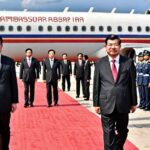Concerns Rise Over Chinese Influence in U.S. Politics Following Indictment of New York Aide
In a recent case that has drawn considerable attention, New York prosecutors charged Linda Sun, a former aide to Governor Kathy Hochul, with acting unlawfully as an agent for the Chinese government. This development has heightened concerns regarding China’s attempts to exert influence on United States political affairs. Ms. Sun, who served in various capacities within the New York state government, is alleged to have promoted Chinese interests at official state events while simultaneously obstructing meetings between Taiwan representatives and key New York state officials. In return, she reportedly received financial incentives amounting to millions of dollars.
This indictment is part of a broader campaign by the United States Department of Justice aimed at identifying and prosecuting individuals connected to Chinese espionage activities on American soil. Historically, previous cases have targeted suspected spies responsible for surveilling critics of the Chinese Communist Party; however, this case illustrates a more direct approach by China to influence U.S. politics, extending even to local governance.
The importance of state-level engagements has risen within the context of deteriorating U.S.-China relations. While bilateral ties were robust in the 2010s, characterized by numerous trade and cultural exchanges facilitated by U.S. governors visiting China, the landscape has changed dramatically. A growing bipartisan sentiment within the U.S. government favors a tougher stance against China, exemplified through increased tariffs and restrictions on high-tech exports. Certain states, including Georgia, Florida, and Alabama, have enacted legislation banning Chinese entities from purchasing real estate.
Mareike Ohlberg, a senior fellow at the German Marshall Fund, indicated that as federal relations worsen, maintaining influence at the state level has become “increased in importance.” Beijing’s strategy, historically rooted in cultivating relationships abroad, is overseen by the Communist Party’s United Front Work Department. This organization comprises various groups that engage with overseas Chinese communities under the pretense of cultural and social activities. Prominent among these entities is the All-China Federation of Returned Overseas Chinese, which seeks to create connections with Chinese populations around the world.
In her work, Ms. Sun established affiliations with Shi Qianping, who is publicly associated with the All-China Federation of Returned Overseas Chinese and leads the U.S. Federation of Chinese-American Entrepreneurs. Additionally, concerns about clandestine operations, such as unauthorized overseas police stations linked to the Chinese government, have arisen in recent years. In a notable incident last year, law enforcement in New York detained individuals accused of creating an undisclosed police outpost for a Chinese provincial authority.
Ms. Sun’s alleged actions provide insight into how China aims to subtly promote its narratives and policies within the United States. Prosecutors claim she solicited content for a video message from a Chinese official that Governor Hochul, during her tenure as lieutenant governor, recorded to celebrate the Lunar New Year. Prosecutors further allege that she prevented the governor from mentioning human rights issues pertinent to China in that video. Moreover, she is accused of obstructing interactions between Taiwanese officials and New York state representatives, as China perceives such engagements as violations of its sovereignty claims over Taiwan.
The Chinese Communist Party has articulated a clear directive for its overseas activities: to unify and mobilize the global Chinese community in support of Beijing’s goals, including modernization efforts. This manipulation extends to domestic issues within the United States, such as the rising violence against Asian Americans, which the Chinese government seeks to leverage for its narrative.
In conclusion, Mr. Ohlberg emphasizes the need for U.S. states to strategically reassess their engagement with China and develop robust mechanisms to connect with local Asian American communities, instead of relying on single individuals, as exemplified in the case of Ms. Sun. The landscape of state-level relations necessitates a comprehensive approach grounded in legitimate partnerships and informed by genuine community needs.







Post Comment